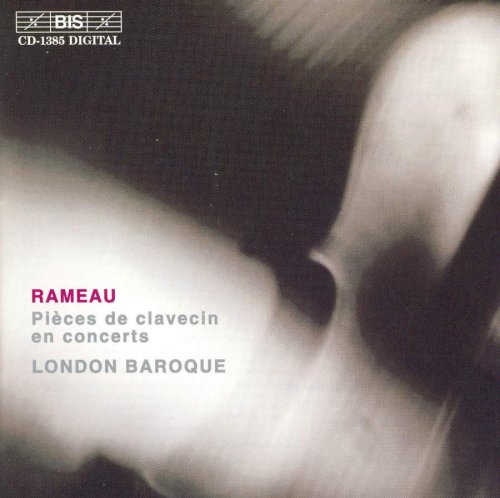
London Baroque - Rameau: Pièces de clavecin en concerts (2003)
BAND/ARTIST: London Baroque
- Title: Rameau: Pièces de clavecin en concerts
- Year Of Release: 2003
- Label: BIS
- Genre: Classical
- Quality: FLAC (image + .cue, log, scans)
- Total Time: 67:00 min
- Total Size: 424 MB
- WebSite: Album Preview
Tracklist:
Jean-Philippe Rameau (1683-1764)
[01] - [03] Concert No.1 in C minor
[04] - [07] Concert No.2 in G major
[08] - [10] Concert No.3 in A major
[11] - [13] Concert No.4 in B flat major
[14] - [16] Concert No.5 in D minor
London Baroque:
Ingrid Seifert violin
Charles Medlam bass viol
Terence Charlston harpsichord
Jean-Philippe Rameau (1683-1764)
[01] - [03] Concert No.1 in C minor
[04] - [07] Concert No.2 in G major
[08] - [10] Concert No.3 in A major
[11] - [13] Concert No.4 in B flat major
[14] - [16] Concert No.5 in D minor
London Baroque:
Ingrid Seifert violin
Charles Medlam bass viol
Terence Charlston harpsichord
Jean-Philippe Rameau was an extraordinarily gifted and imaginative composer as highly esteemed in his day as he continues to be in ours. With the exception of his oeuvre for harpsichord, Rameau’s Pièces de clavecin en concerts represents the only chamber music he composed in his long and prolific life. Unlike his solo harpsichord works, which mostly count among his earliest compositions, Rameau’s six settings for harpsichord, flute/violin, and violin/cello were written much later in 1741 when he was at the height of his powers. And throughout these often widely diverse, emotionally charged, and programmatically alluring works we cannot help but hear Rameau auspiciously summarizing in chamber scale his varied achievements to date.
There are many fine recordings of the Pieces de clavecin en concerts on CD, though few take full advantage of the interpretive possibilities in these scores. This new performance by London Baroque is as accomplished as we might expect from these veteran players; however, given the competition, its few minor shortcomings (and one major one) prevent this ensemble’s otherwise worthy offering from ranking among the best.
As with most other performances (the Leonhardt Consort on Teldec being the most notable exception) London Baroque observes all repeats yet fails to make the most of their expressive potential. Compare for instance their treatment of the opening “La Laborde” of the second Concert to the performance by the Ensemble Baroque du Festival D’Aix-En-Provence on Pierre Verany. Though certainly vivid and lively, London Baroque’s slightly slower tempos and rather unimaginative delineation of line (compared to Pierre Verany’s viola de gambist Sylvie Moquet!) make for a less compelling ideal. Other moments also are less interesting than they could be: London Baroque’s rendering of the potentially mesmerizing second-movement “L’indiscrete” of the fourth Concert could use a bit more of the alacrity and verve demonstrated by the Leonhardt Consort or by Pinnock/Podger/Mason on a recent Channel Classics recording.
But the major problem with London Baroque’s performance lies with its omission of the optional flute obbligato that most groups sensibly include. Without it, the full range of the composer’s broadly diverse musical palette becomes greatly diminished–“La Livri” loses its eerie melancholy, “L’Agaçante” is denied its elegant air, and “La Cupis” simply doesn’t flower as brightly as it should. Listeners familiar with other performances that incorporate this vital wind element will lament its absence here. -- John Greene, ClassicsToday
There are many fine recordings of the Pieces de clavecin en concerts on CD, though few take full advantage of the interpretive possibilities in these scores. This new performance by London Baroque is as accomplished as we might expect from these veteran players; however, given the competition, its few minor shortcomings (and one major one) prevent this ensemble’s otherwise worthy offering from ranking among the best.
As with most other performances (the Leonhardt Consort on Teldec being the most notable exception) London Baroque observes all repeats yet fails to make the most of their expressive potential. Compare for instance their treatment of the opening “La Laborde” of the second Concert to the performance by the Ensemble Baroque du Festival D’Aix-En-Provence on Pierre Verany. Though certainly vivid and lively, London Baroque’s slightly slower tempos and rather unimaginative delineation of line (compared to Pierre Verany’s viola de gambist Sylvie Moquet!) make for a less compelling ideal. Other moments also are less interesting than they could be: London Baroque’s rendering of the potentially mesmerizing second-movement “L’indiscrete” of the fourth Concert could use a bit more of the alacrity and verve demonstrated by the Leonhardt Consort or by Pinnock/Podger/Mason on a recent Channel Classics recording.
But the major problem with London Baroque’s performance lies with its omission of the optional flute obbligato that most groups sensibly include. Without it, the full range of the composer’s broadly diverse musical palette becomes greatly diminished–“La Livri” loses its eerie melancholy, “L’Agaçante” is denied its elegant air, and “La Cupis” simply doesn’t flower as brightly as it should. Listeners familiar with other performances that incorporate this vital wind element will lament its absence here. -- John Greene, ClassicsToday
Related Release:
Classical | FLAC / APE | CD-Rip
As a ISRA.CLOUD's PREMIUM member you will have the following benefits:
- Unlimited high speed downloads
- Download directly without waiting time
- Unlimited parallel downloads
- Support for download accelerators
- No advertising
- Resume broken downloads


